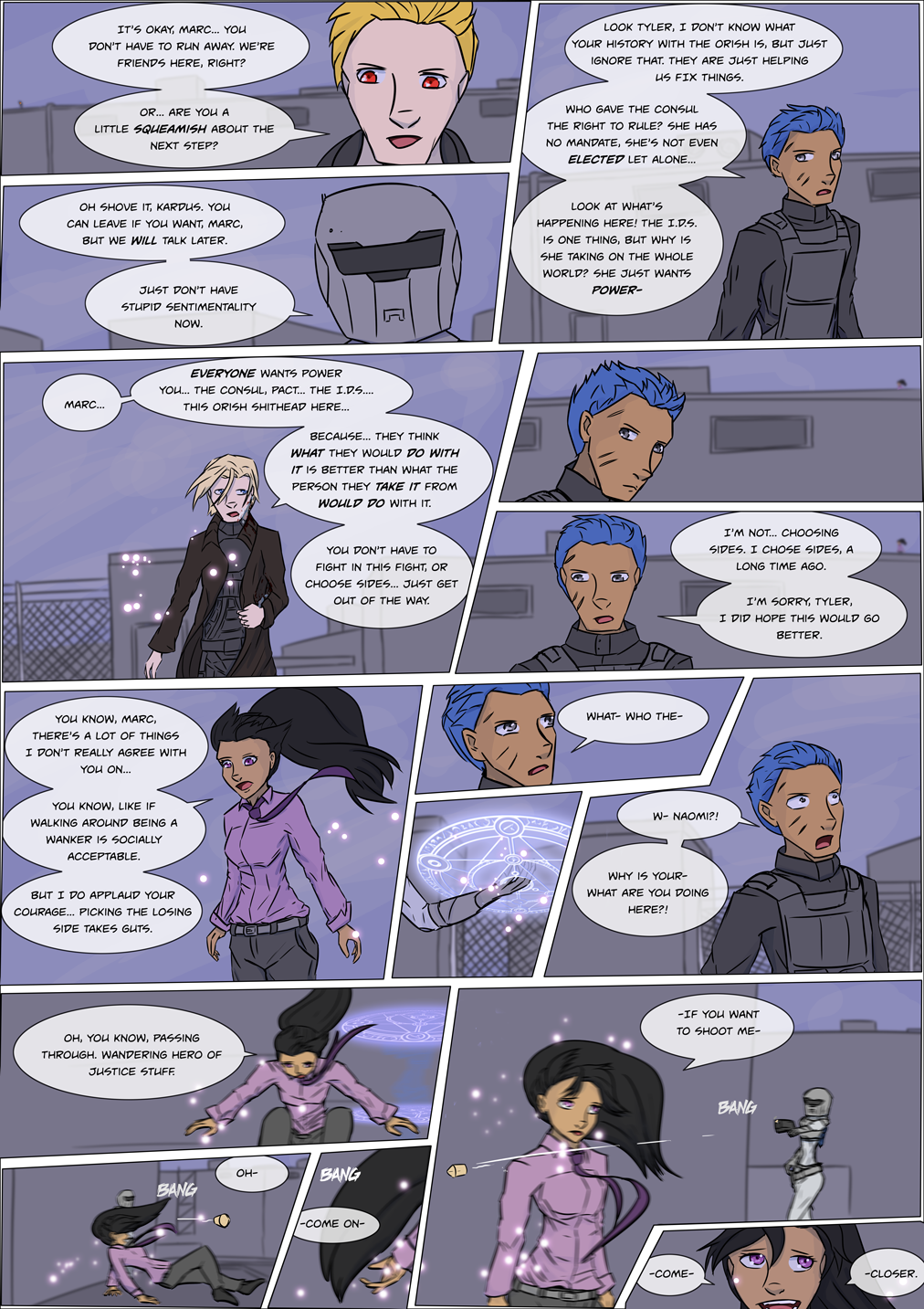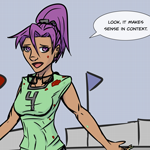Comic for Monday, February 19th, 2018
While we’ve seen that Naomi can be shot, it’s pretty hard to shoot her if she knows where you are. This is has less to do with that she moves far more quickly than a human should, and more to do with something that’s been hit on a few times – her ability to see – and her more complicated senses like spatial awareness – are boosted as well as her strength. This is less normal among boosters than things like speed and strength, as those are easier to quantify difference in. This matters quite a bit when you are avoiding being shot, as being missed by a few inches is something that doesn’t really phase her, given her confidence in if it will hit or not before it does; to her, a handgun is more like a long poking stick – you just don’t stand in the line the bullet will hit, and you’ll be fine.
Much what makes Naomi’s power slightly unique is exactly how little talent she has in quantifying these differences consciously, thus boosting a sense like spatial awareness, a normal person might have a great deal of trouble defining what exactly a vastly superior sense of spatial awareness means; or how to really apply the ability once they have it if something directly manipulated their data to have it, that doesn’t really effect Naomi, as she just skips, well, almost all the steps in magic activation, thus tends to leave her “Key” to resolve almost all of the change, which builds far more interlocked edits. This is, of course, why more complicated calculations she tries usually fail; it’s like if when you’re programming it automatically includes all the classes you try to use without you manually importing them; if you don’t really know what they are, that’s great, but very quickly you’d run into trouble as it starts including way too many systems to viably handle – her ability to process cause from effect with her Key is higher than normal by a substantial amount, but can’t really replace calculations.
She can, technically, calculate magic. She’s just pretty bad at it. Of course, most people can be trained to do it with enough effort. The hard part is doing them quickly – not just quickly in the sense that “before you get hit by a bullet” but also quickly in the sense that magic needs to process in what amounts to a very small amount of time, and most people can’t store the entire sequence in their memory effectively – it’s been mentioned a few times but Eidos data is really quite hard to understand for a human brain.
This isn’t really inherently part of being an innate mage, as Tyler there proves. For him, calculating the innate magic we see him use is far easier than it has any right to be, and writes to Eidos far more effectively the magic normally does, but he can still run other calculations like a normal natural mage. Not all of his his abilities are based off his innate magic, but since there are certain properties that easier for him to edit than others, he tends to use them as a crutch in his calculations wherever possible. Ultimately this ends up being fairly similar to a mage like Kally whose not an innate mage, but tends to rely on a few spells she has used a lot more than others – for her, summoning a dragon Eidos Form is probably faster than than summoning a crude cylinder shape would be, because it’s the equivalent of always on the tip of her tongue, even though her Key doesn’t process that data any more or less efficiently (presumably…) than any other spell. I guess that’s to say it’s different parts of the process that being expedited or made more efficient.
…anyway… been awhile since I rambled in one of these about magic, so… figured this box could use some rambling.
Speaking of which… I think we’ll do another Q&A to celebrate new Patreons, new Year, and general upness of goodness… so! Got a question you want answered in the next Q&A? Ask away!
As usual, if it’s about the comic world/mechanics/etc, I will almost certainly answer it, if it’s about the comic plot, I will only answer it if it’s not really a spoiler, and if it’s about me the author or random shit, I’ll just maybe answer it 🙂





In the first panel, it looks like Kardus is assessing Marc like someone assesses fish in a grocery market. “It’s okay Marc” as opposed to addressing Marc in conversation. “It’s okay, Marc.” Goes double for the Orish in the panel just below. “Oh shove it Kardus” … Is shoving things Kardus some kind of Orish sentiment, like “shove it upward” or is Kardus being addressed “Shove it, Kardus.” And then he goes on to imply that someone else can leave if Marc is taken too. “You can leave if you want Marcus” as opposed to “You can leave if you want, Marcus.” I mean, is whoever the Orish speaking to want to spirit Marcus away, or is the Orish speaking to Marcus?
Well, I’m relieved that I don’t want Marc, as I like it here. 🙂
Fixed, I think! Thanks 🙂
Just_IDD: The books you mention are the Wiz series by Rick Cook. Still in print on Amazon.
Page will, of course 🙁 , be up tomorrow afternoon, not tonight. Q&A will be included with Monday comic, so you still have time to submit questions via email or comments or Patreon (I have ~7 so far).
There was a chance for tonight, but somewhere in the process the page went from 10 panels to 16, as so frequently happens, so… nope! Still got some work and other stuff I need to do tonight too. But tomorrow, almost certainly.
So… action sequence with splinter-panels incoming, then?
Oh oh, a Q/A!
Here is some things I have been thinking on:
So we know that powerful mages can create an Eidos construct that can, at least to a certain extent, “think for itself” (ie Kally’s dragon can react to threats that Kally herself is unaware of). This leads to:
At what speed do Eidos programs respond to input?
If they are limited by the casters own processing speed, it would make sense, though it would put some limitations on what one could do with them (though could then using an auto caster allow for much quicker reacting automation capable of doing things like catching bullets, or shooting down missiles).
If they are not limited by the caster, but instead by some other factor (say some universal constant of magic) it opens different possibilities. For example, if it is possible to create a construct that can run logic faster then whatever created it can. The most obvious abuse of this would be to to create a spell, that when cast (likely with the help of an auto caster) then does the calculations for another more difficult spell. It could also be put to more “mundane” applications, like brute forcing RSA.
Another possibility that now occurs to me as being likely is that it would be limited by how fast the caster can write Eidos data. If so then the whole idea would be little more then a curiosity, unless a mage can write Eidos data faster than they themselves could calculate the changes they want to make. If so then they could use a portion of their magic as a sort of magically created auto caster.
Thinking about it, all sorts of fascinating possibilities open up when treating magic like programming.
Could a spell be designed to follow logic encoded in a premade physical object in order to reduce the spell’s size?
What about recursive spells? (as in recursive programs)
What would a magic self replicating spell be like?
Now I guess making one properly would require the solving of the whole “artificial Eidos key” problem. Nonetheless, it would raise the stakes from infinite power in the face of conservation of energy and autonomous magical factories, to godhood and the whole planet (or more) being turned into a self replicating magical machine.
(sorry for rambling a bit)
My guess is that edios constructs would process information in a similar way to physical constructs. So certain detailed and complicated constructs could contain circuit-like parts which compute substantial amounts, but that would put a burden on the caster to make the complicated construct in the first place. And I think we already know that complicated constructs are more difficult to maintain than simpler ones.
Now, how great is this computational power? Looking back at Atter’s red demon constructs http://pastutopia.com/?comic=comic-for-thursday-august-31st, the ones outside of his control were substantially more predictable and less dangerous, because they couldn’t rely on his direction and computational power. This suggests that their computational power was much less than Atter’s power.
So this suggests some fairly mundane answers to your questions. Recursive or self replicating magic, if possible, would most likely lose power with each recursion. Sort of like every layer of abstraction lowers performance on computers. Also, infinite power sources aren’t good story mechanics in this genre….
“a spell designed to follow logic encoded in a premade physical object” I don’t think we have seen any autocasters which create red constructs, but in theory I think an autocaster should be able to create the construct, and also program it. But I am guessing that Atter’s autonomous constructs are right up there with teleportation as some of the most poorly understood magic, so I don’t think an autocaster like that exists like that, even in Kor’s world.
You make a number of good points, however for the “follow logic encoded in a premade physical object” part I was thinking something a little different. My thoughts were more along that lines of taking lets say a rock and either through magic or more mundane methods embedding in instructions for a spell or part of a spell. Then the caster, instead of having to cast the entire spell could utilize information from the rock. One could say take a red construct and instead of having to program in all the behaviors you want it to have when casting it just cast it around a rock and program it to follow the instructions in the rock.
We have seen spells written to Wood. So whether or not the staff that Nathan carries has some other intelligence embedded in it it is definitely something that he uses to write to Edos in ways and with things that he can’t remember. Almost like query but query can’t actually cast as far as We Know.
On a completely unrelated note there were three novels or really two-and-a-half novels set in a world that is adjacent to ours where magic follows rules of programming. Such that when a programmer got sucked into that world he became the most powerful magician ever because of his ability to write code that was an executed by little amps that would appear called Daemon’s. How do you say two and a half books because unfortunately the author Robin Hobb ran into some medical difficulty and was unable to finish the final Wizardry book. He did release what he had written and his notes for where he was going to try to round out the stories for his readers which is something that I really appreciate him doing. He also wrote several other books that I also have that are a different kind of magic basically than the way it’s normally portrayed.
*Casually dodges bullets* “What?”
If she were any more nonchalant about it I think she could claim (and sound believable) that she didn’t even know they were there.
(Torn, though, if that or her line to Marc would be a funnier insult. (Or, just, well, more insulting.))
Is it just me or does it seem like Naomi’s “spatial awareness” is the sort of thing that leads to accidentally learning to teleport while trying to fly… at which point she gets upset because of her latest failure while everybody else is throwing a fit about how impossible it is.
Panel 3: “She’s has no mandate” should be “She has no mandate”
—
I suddenly have a lot more questions about how Malsa’s (current) government works.
And how the current Malsan government came into existence, since from things that have been said about the Families and the “princess”, I’d gotten the impression that Malsa used to be a monarchy, with the “Families” being what’s left of the nobility/aristocracy, or something a bit like renaissance Venice’s oligarchy, but with a hereditary bloodline for the Doge (thus the like a “princess” stuff), and the Malsan Families occupying the role of Venice’s Senate.
Fixed, thanks 🙂
As for the politics of Malsa, it’s sort of one of those background events that we see bits and pieces of. I suppose in some ways that’s more Tyler’s Story and the Consul’s Story than Peter’s Story, but I think we’ll see enough of it to answer at least give a lot of spoilers for those stories 😉
It is, like most things, pretty complicated. Suffice to say there’s some uncovered ground there.
I guess I have 2 questions for the Q&A. The answer to this will be wordy, but that’s ok, Q&A’s are how you get past the wordy bits.
The other is how did Peter and Naomi meet, and was she someone who Peter ‘found’ or was she a surprise?
I second this question about Malsa’s government. They talk about elected officials, and unelected officials, and even the inclusion of the old families; yet we have no idea how these all interact or where in what power structure they are actually included.
For instance with the old families: Is it anything like the symbolic authority of many RW nobility, are they actually supported financially or otherwise by the state, what exactly are the external expectations applied to them (beyond their own self imposed “nobeles oblige”), what rights do they have in return beyond that of the normal person? And, of curse, this brings up other questions that draw from the fact that they are a magical society of great magical capability in modifying even the data of a human body (even with greater difficulty); specifically I am thinking of the fact that RW science understands what causes aging but can’t really do anything about it, where magic would not be so constrained from holding back a person from reversing old age and therefor obtaining a measure of immortality. The way THAT would mess with a power structure is IMMENSE. Seriously.
And then we have the issues with “designer children” and what seems to be something of a segmented society between those with access to magic (either personally or hired) and those without? Is it “one man one vote” or are there other weighting factors? The system doesn’t seem to be the American form, or likely similar to the British or any european system that I can immediately identify with, so is there a RW equivilent or is it something almost completely unique to that world.
For that matter is Malsa’s form of government representative of the area or are some of the more warlike nations (say Orin or others) using a completely different system? When you add in magic the obvious next question is theology: are there any Theocracys or even any sufficiently powerful belief systems to create them? How if at all have belief systems been affected by the presence of such obvious manipulation of the laws of reality.
Heck, in world theology could be an entire question of its own. Afterall; everyone needs to have SOME answer to the fundamental questions of right and wrong, the ultimate “WHY”, and mankind’s place in the universe. And while for many the answer of “you make your own reason” and “we are a coincidence of the far end of probability in the face of entropy” may be enough, that will DEFINITELY NOT be enough for the majority of people (especially with magic so clearly visible).
really enjoying the Naomi lines at the very end.
So let me get this straight…. You used a coding metaphor to explain what is happening in a fantasy world. (“it’s like if when you’re programming “).
Not a sports metaphor, not a hunting metaphor, not a popular culture metaphor or a politics metaphor, but a software development reference.
Here’s an item for your Q&A. How many times have you compared something you’re explaining to software development and had the person’s eyes light up with comprehension?
If the answer is more than once, and you’re thinking of a job change, send me a resume. On second thought, I like you. I wouldn’t want to inflict my employer upon you.
I suspect this is more a matter of his audience being fellow coders than anything else, but hey, maybe he clarifies things better than most coders.
As @Segev notes, yeah, that might have something to do with the company I keep these days.
For a long time I was always the middleman between the software engineers and the rest of the business world as I was a late convert to programming so I spoke fluent BusinessSpeak (it’s really just a corrupted version of the Bullshiticus I learned as a philosophy major back in the day) and ProgrammerGrumble, but lately I think I’ve been sliding further into the programmer bucket, as most everyone else that’s competent has quit the field in the face of the tides of madness.
It comes with the territory. My title has Sr. in now, so I’m obligated to occasionally growl at clients and rant about how their hierarchies are unoptimized and other scary sounding nonsense while they have a terrified and confused look.
I wander what percentage of the readers are software people. I would guess higher than national average by a fair margin, but probably under a quarter of readers. I guess I’ll need to make more diversified metaphor trees.
Future poll?
I feel like you need a more nuanced split, though.
Something like “How well do you speak software?”
[Native Speaker/Second Language/Took It In High School For Two Years, Got A C/Not At All]
(Out of which I’d be the second, personally.)
I fall into the category of exposed to coding. I’m a systems integrator and administrator for software development companies. I often get stuck between customers and programmers to do the same types of things @pastutopia seems to do. I still lose my boss on occasion because he wants me to explain highly technical things in non-technical ways and then in the process of telling me what I told him tells me something that’s completely wrong because he gets the steps out of order. As all programmers know getting the steps in order is very important! As are doing things in the IT world in general. The order you do things in means they work or don’t work.
I would guess by ‘Native Speaker’ you mean people like me who understand programming better than English? (English being my official native language, and effectively only human language, despite having studied Spanish, French, German, Danish, Latin, Italian, Japanese, Chinese, and probably a few I’ve completely forgotten.) Note that this is less of a brag about my programming skills, and more a comment on my linguistic difficulties, which would be much more apparent outside of a ‘typed at my leisure’ context, and vastly more apparent in a spoken context.
Naomi really is just the best. “…picking the losing side takes guts.”
Tyler and Kally both might be more powerful, but they just don’t have the same flair when it comes to kicking people’s asses. Naomi just makes smiting evil look like a blast.
I mean, to be fair, she does seem to think smiting evil is a blast. Everyone in Peter’s camp is a little bit crazy.
I mean, hey, I’m pretty sure I would feel the same way in her place.
If you’re not too concerned about your life in most scenarios, it becomes like an extreme sport – theoretically risky if you screw up, but so long as you’re good, you should be fine. You have safety equipment most of the time (Mium), and your own skill can get you out of a lot of scrapes.
So yeah, I think it’s totally fine!
… On the other hand, I guess I can’t technically speak to my own sanity…
Marc seems to be reacting to Naomi’s appearance way like someone tied him up and and was slowly lowering him into a cage with a man eating tiger.
Yup. He knows who she is. And what she can do.
If your spatial awareness is particularly good, moving slightly can be more conducive to not being hit than moving a great deal. If you move slightly, the person shooting might possibly not realize you’ve moved. If you move a great deal, they will re-aim. Just saying.
Naomi seems to consider being shot as… rather pedestrian.
For some reason it keeps happening to her lately.
Speaking of quich
which
efficiently (persumably
presumably
Fixed, thanks 🙂
It boggles my mind that people actually read all those words, but… if you’re going to go to that effort, the least I can do is fix it.
Panel 3: “Look Tyler, I don’t know what your history with the Orish is, but just ignore that. they are just helping us FIX things.”
Also, to be quite pedantic: panel 4, “I.D.S….” should probably have four periods after it (one for the acronym, three for the ellipsis).
Fixed, thanks 🙂
Fixed, thanks 🙂